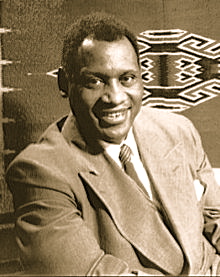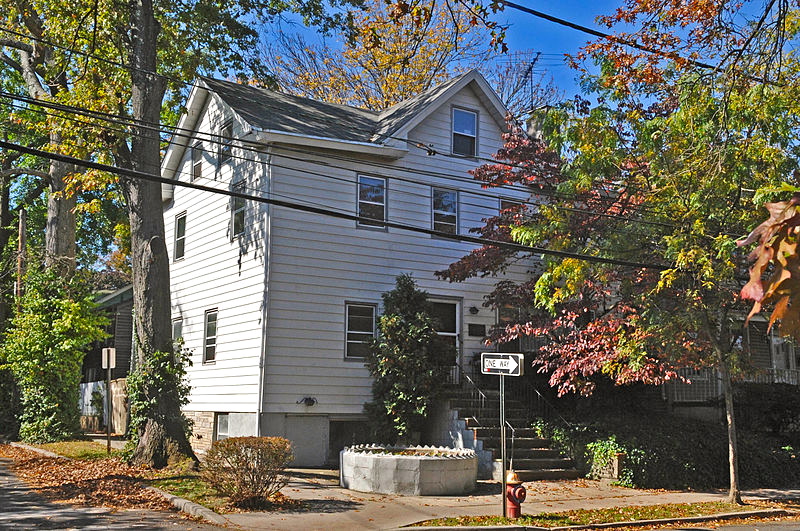The Great: Paul Robeson
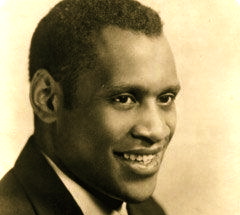
Life of Paul Robeson by Kevin Maynor
Trilogy: An Opera Company in Newark, NJ has commissioned a new work based on the life of Paul Robeson. Trilogy’s founder Kevin Maynor will sing the title role. In this video we sit in on a rehearsal and hear why the opera is such a significant undertaking. Adolphus Hailstork is the composer.
Paul Robeson
Paul Leroy Robeson (/ˈroʊbsən/; April 9, 1898 – January 23, 1976) was an American singer and actor who became involved with the Civil Rights Movement. At Rutgers College, he was an outstanding football player, then had an international career in singing, with a distinctive, powerful, deep bass voice, as well as acting in theater and movies. He became politically involved in response to the Spanish Civil War, fascism, and social injustices. His advocacy of anti-imperialism, affiliation with communism, and criticism of the United States government caused him to be blacklisted during the McCarthy era. Ill health forced him into retirement from his career.
Robeson won an academic scholarship to Rutgers College, where he became a football All-American and the class valedictorian. He received his LL.B. from Columbia Law School, while playing in the National Football League (NFL). At Columbia, he sang and acted in off-campus productions; and, after graduating, he became a participant in the Harlem Renaissance with performances in The Emperor Jones and All God’s Chillun Got Wings. Robeson initiated his international artistic résumé with a theatrical role in Great Britain, settling in London for the next several years with his wife Essie.
Robeson next appeared as Othello at the Savoy Theatre before becoming an international cinema star through roles in Show Boat and Sanders of the River. He became increasingly attuned towards the sufferings of other cultures and peoples. Acting against advice, which warned of his economic ruin if he became politically active, he set aside his theatrical career to advocate the cause of the Republican forces of the Spanish Civil War. He then became active in the Council on African Affairs (CAA).
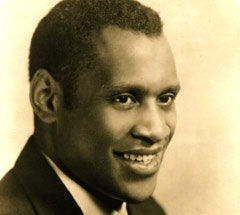 During World War II, he supported America’s war efforts and won accolades for his portrayal of Othello on Broadway. However, his history of supporting pro-Soviet policies brought scrutiny from the FBI. After the war ended, the CAA was placed on the Attorney General’s List of Subversive Organizations and Robeson was investigated during the age of McCarthyism. Due to his decision not to recant his public advocacy of pro-Soviet policies, he was denied a passport by the U.S. State Department, and his income, consequently, plummeted. He moved to Harlem and published a periodical critical of United States policies. His right to travel was eventually restored by the 1958 United States Supreme Court decision, Kent v. Dulles, but his health broke down. He retired and he lived out the remaining years of his life privately in Philadelphia.
During World War II, he supported America’s war efforts and won accolades for his portrayal of Othello on Broadway. However, his history of supporting pro-Soviet policies brought scrutiny from the FBI. After the war ended, the CAA was placed on the Attorney General’s List of Subversive Organizations and Robeson was investigated during the age of McCarthyism. Due to his decision not to recant his public advocacy of pro-Soviet policies, he was denied a passport by the U.S. State Department, and his income, consequently, plummeted. He moved to Harlem and published a periodical critical of United States policies. His right to travel was eventually restored by the 1958 United States Supreme Court decision, Kent v. Dulles, but his health broke down. He retired and he lived out the remaining years of his life privately in Philadelphia.
Early life – Childhood (1898–1915)
Paul Robeson was born in Princeton, New Jersey, in 1898, to Reverend William Drew Robeson and Maria Louisa Bustill. His mother was from a prominent Quaker family of mixed ancestry: African, Anglo-American, and Lenape. His father, William, whose family traced their ancestry to the Igbo people of present-day Nigeria, escaped from a plantation in his teens and eventually became the minister of Princeton’s Witherspoon Street Presbyterian Church in 1881. Robeson had three brothers: William Drew, Jr. (born 1881), Reeve (born c. 1887), and Ben (born c. 1893); and one sister, Marian (born c. 1895).
In 1900, a disagreement between William and white financial supporters of Witherspoon arose with apparent racial undertones, which were prevalent in Princeton. William, who had the support of his entirely black congregation, resigned in 1901. The loss of his position forced him to work menial jobs. Three years later when Robeson was six, his mother, who was nearly blind, died in a house fire. Eventually, William became financially incapable of providing a house for himself and his children still living at home, Ben and Paul, so they moved into the attic of a store in Westfield, New Jersey.
William found a stable parsonage at the St. Thomas A. M. E. Zion in 1910, where Robeson would fill in for his father during sermons when he was called away. In 1912, Robeson attended Somerville High School, Somerville, New Jersey, where he performed in Julius Caesar, Othello, sang in the chorus, and excelled in football, basketball, baseball and track. His athletic dominance elicited racial taunts which he ignored. Prior to his graduation, he won a statewide academic contest for a scholarship to Rutgers. He took a summer job as a waiter in Narragansett Pier, Rhode Island, where he befriended Fritz Pollard, later to be the first African-American coach in the National Football League.
Rutgers College (1915–1919)
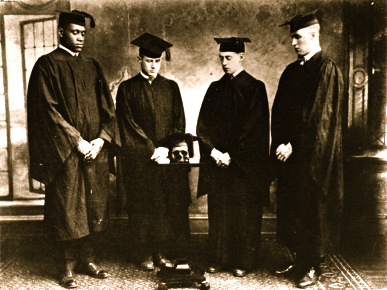 Robeson (far left) was Rutgers Class of 1919 and one of four students selected into Cap and Skull
Robeson (far left) was Rutgers Class of 1919 and one of four students selected into Cap and Skull
In late 1915, Robeson became the third African-American student ever enrolled at Rutgers, and the only one at the time. He tried out for the Rutgers Scarlet Knights football team, and his resolve to make the squad was tested as his teammates engaged in unwarranted and excessive play, arguably precipitated by racism during which his nose was broken and his shoulder dislocated. The coach, Foster Sanford, decided he had overcome the provocation and announced that he had made the team.
Robeson joined the debate team and sang off-campus for spending money, and on-campus with the Glee Club informally, as membership required attending all-white mixers. He also joined the other collegiate athletic teams. As a sophomore, amidst Rutgers’ sesquicentennial celebration, he was benched when a Southern team refused to take the field, because the Scarlet Knights had fielded a Negro, Robeson.
After a standout junior year of football, he was recognized in The Crisis for his athletic, academic, and singing talents. At what should have been a high point of his life, his father fell grievously ill. Robeson took the sole responsibility in caring for him, shuttling between Rutgers and Somerville. His father, who was the “glory of his boyhood years” soon died, and at Rutgers, Robeson expounded on the incongruity of African Americans fighting to protect America in World War I and, contemporaneously, being without the same opportunities in the United States as whites.
He finished university with four annual oratorical triumphs and varsity letters in multiple sports. His play at end won him first-team All-American selection, in both his junior and senior years. Walter Camp considered him the greatest end ever. Academically, he was accepted into Phi Beta Kappa and Cap and Skull. His classmates recognized him by electing him class valedictorian. The Daily Targum published a poem featuring his achievements. In his valedictory speech, he exhorted his classmates to work for equality for all Americans.
Columbia Law School and marriage (1919–1923)
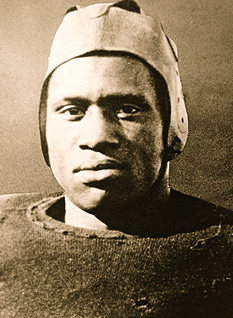 Robeson’s football career – Robeson in football uniform at Rutgers, c. 1919
Robeson’s football career – Robeson in football uniform at Rutgers, c. 1919
Robeson entered New York University School of Law in the fall of 1919. To support himself, he became an assistant football coach at Lincoln, where he joined the Alpha Phi Alpha fraternity. However, Robeson felt uncomfortable at NYU and moved to Harlem and transferred to Columbia Law School in February 1920. Already known in the black community for his singing, he was selected to perform at the dedication of the Harlem YWCA.
Robeson began dating Eslanda “Essie” Goode and after her coaxing, he gave his theatrical debut as Simon in Ridgely Torrence’s Simon of Cyrene. After a year of courtship, they were married in August 1921.
He was recruited by Pollard to play for the NFL’s Akron Pros while Robeson continued his law studies.[57] In the spring, Robeson postponed school to portray Jim in Mary Hoyt Wiborg’s Taboo. He then sang in a chorus in an Off-Broadway production of Shuffle Along before he joined Taboo in Britain. The play was adapted by Mrs. Patrick Campbell to highlight his singing. After the play ended, he befriended Lawrence Brown, a classically trained musician, before returning to Columbia while playing for the NFL’s Milwaukee Badgers. He ended his football career after 1922, and months later, he graduated from law school. To learn more about Paul Robeson go to the link below.

